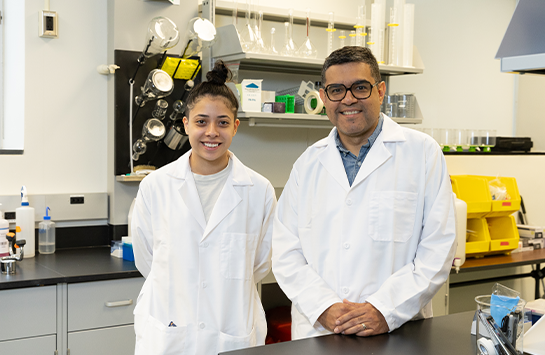José Villegas receives NIH New Innovator award
Introduction
Two UIC researchers José Villegas and Ruixuan Gao have received New Innovator awards from the National Institutes of Health to fund high-risk, high-reward research at the cutting edge of science. Gao and Villegas are the first UIC faculty members to receive New Innovator awards from the NIH. The awards select and fund exceptional early career investigators to pursue unconventional, innovative work with the potential for high impact across science and medicine.
Villegas, an assistant professor in the college's Department of Pharmaceutical Sciences, received a New Innovator Award from the National Institute of Allergy and Infectious Disease. His work uses computational methods to design new strategies for treating viruses and cancer.
Designing traps for viruses

When designing drugs, researchers typically seek a compound that can bind to a target and block its activity — for example, inactivating a viral enzyme. But these selective drug-target binding opportunities are difficult to design with current tools and tough to execute at dosages that make sense therapeutically.
Villegas combines biomaterial design and medicinal chemistry to take a different approach: trapping molecular targets as they are formed. He uses computational models and artificial intelligence to create strategies for disrupting viruses, rendering them non-infectious.
“What we want to do is not necessarily block the interactions between viral proteins but rather just kind of push them in the wrong direction,” Villegas said. “We use small proteins or peptides to perturb their assembly process and drive viruses to be misshapen or simply nonfunctional.”
This different approach has several advantages, Villegas said. Because these compounds don’t need to bind to a specific functional site on the target, it’s less computationally intensive to run drug design simulations. Villegas hypothesizes that this strategy should also make it harder for drug resistance to evolve.
“We normally design these drugs to be super tightly binding, and these interactions are so precise that any small change the virus makes can kick out that drug,” Villegas said. “But if we’re not relying on those strong interactions, then the hope is that it won’t be so easy to kick out, because there won’t be just one little mutation that can just destroy the approach.”
The NIAID New Innovator Award will support Villegas as he attempts to apply this approach to HIV; for example, by disrupting the formation of the protective capsid shell of the virus. If successful, the project will provide proof-of-concept that this method could be used in other disease contexts, such as inactivating genetic factors that boost the proliferation of cancer cells.
It’s Villegas’ first major award since he became full-time UIC faculty last year via the Bridge to Faculty program, led by the UIC Office of Diversity, Equity and Engagement. The program recruits academics from underrepresented backgrounds to serve as postdoctoral scholars for two years before transitioning to a junior faculty position.
For Villegas, who grew up moving between the United States and Mexico, the program and the broader UIC mission made the university the right home for his research, teaching and outreach.
“It seemed like the values that the university embodies are very much in line with my own values and how I see the purpose of education,” Villegas said. “I knew I would prefer to be at a public university in a place where we’re also contributing to upward mobility and reaching out to underserved communities.”